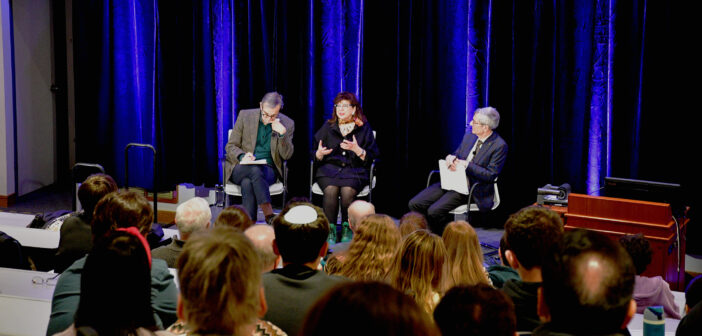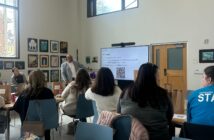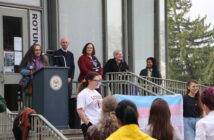President Joseph J. Helble facilitated a discussion Tuesday on how to approach conversations surrounding the Israel-Palestine conflict, bringing together two Dartmouth College scholars to share their perspectives.
The event, titled “Fostering Understanding: Difficult Conversations on Israel and Palestine,” took place in the Perella Auditorium of the Rauch Business Center, with an audience of about 100 people. It featured Susannah Heschel and Ezzedine Fishere — two faculty members from Dartmouth College who are experts in their respective fields.
Heschel, a professor and chair of the Jewish studies program at Dartmouth, is also an author and scholar of Jewish and Protestant thought.
Fishere, an Egyptian writer, diplomat and distinguished fellow at Dartmouth, previously served as an ambassador for Egypt’s foreign service.
Before beginning the conversation, Helble emphasized this event was structured differently from Lehigh’s Compelling Perspectives series, which features a single guest speaker on a certain topic.
Instead, he said, this discussion was held to encourage an exchange of ideas.
“Today, we do have two individuals, but I think it’s a single perspective they share on the importance of being open to dialogue, even on the most extraordinarily difficult topics,” Helble said.
He also said he hoped the audience would be open to having a reflective and engaging conversation that benefited from the bringing together of different voices.
When asked about their work together at Dartmouth, Heschel said she and Fishere are close colleagues and friends who co-teach classes and co-sponsor events.
Heschel said after the events of Oct. 7, 2023, the two increased the number of courses they co-teach about the conflict and made themselves available to discuss the topic with their campus community.
Fishere recalled a time when a statement about the conflict, issued by his colleagues at Dartmouth, upset members of the community who believed the statement was biased.
In response and in an effort to mitigate tension, Fishere said he decided to reach out to an Israeli American colleague to co-teach a course, exploring different perspectives about the conflict.
Helble then asked about a meeting Heschel and Fishere hosted for the Dartmouth community following the events of Oct. 7 and how they approached navigating the conversation.
Fishere said they asked attendees to “check their emotions at the door” prior to the event to prevent tensions from rising.
“You can imagine how this went down,” Fishere said.
When students began yelling at them and calling them “jokes,” Fishere said they realized it’s impossible to separate emotions from discussions about this topic, as it innately involves anxiety and unrest.
“Learning, by definition, is knowing things that you didn’t know, and those things are bound to contradict what you take for truth,” he said. “How do you deal with that, especially in a conflict that touches identity, history and a deep sense of anxiety on both sides?”
Heschel said she understood the students’ frustrations, as she would also feel deeply upset when people had critical things to say about Israel while she was in college. With time, she said, she learned to respond to criticisms by acknowledging there may be truth in opposing perspectives and learning from them as a result.
She said she respects the feelings of her colleagues, friends and family, but Heschel once was shocked to hear someone say they were “exhilarated” following the initial events of Oct. 7.
Heschel also said rejoicing over death is something she hears from people on both sides of the conflict.
“I don’t feel exhilarated by death, even the death of people who may be my enemies,” she said. “I worry the emotional fragility we have can be limited to our own tribe, but we have to feel for others as well.”
Helble then asked the speakers about what makes a university positioned to facilitate these difficult discussions.
Fishere said while everyone has emotions and the right to express them, universities provide an outlet for people to not only express their views but also learn from those they disagree with.
“Is the best use of a campus to stand in the middle of it with a flag?” he asked. “Or is it to engage and learn and take classes about things that may upset me or expand my knowledge on it?”
The speakers were then asked how they navigate the current world of higher education, which Helble said has recently “been observed keenly by many groups outside of the university.”
Heschel said universities have a responsibility to one another to strengthen their respective communities to afford future generations the privilege of attending college.
She also said her primary concern is not self-expression, but how she can contribute to her community.
Helble echoed this sentiment, saying how in recent weeks, he has woken up each day unsure of what he would be addressing throughout it.
Fishere said he believes refocusing the mission of universities as places of education and intellectual growth would make it more difficult for external pressures to undermine them.
Helble then asked about the importance of studying the history of the conflict alongside current events.
Fishere said while teaching a course about the conflict, he prefaces to students that they won’t be happy if they’re taking the class to learn who’s right and who’s wrong. He said he instead explores the historical context which led to the current situation.
Heschel said in her Jewish studies classes, it’s important to talk about Palestinian history as well.
“I’d rather have students understand it’s complicated, it’s difficult, it’s a struggle and it’s hard to come in with a definitive answer or narrative,” she said.
Fishere said one of the most striking aspects he’s found while teaching students about the conflict is that there are far more similarities than differences among people’s perspectives.
There is a “mirror image that pro-Palestinian and pro-Jewish students have in their fears and in their complaints,” he said.
Before opening the discussion to questions from the audience, Fishere and Heschel emphasized they are always learning from one another, and they help each other grow as professors and people.
The first audience question came from a Lehigh staff member, who asked about common sticking points that are hard for people to understand and concessions both sides of the conflict would need to make.
In response, Fishere said rather than focusing on concessions to reach agreement, it’s more important to recognize that people on either side of the conflict share similar concerns but view them from different perspectives.
Another question came from a Lehigh student who referenced violations of international law committed by the Islamic State and asked what precedent it sets when the United States doesn’t uphold international law.
Fishere said international law doesn’t necessarily prevent or end conflicts but instead regulates how parties behave during them.
“‘Can you rely on international law to prevent states from doing things when they are existentially threatened?’ The answer is no,” Fishere said.
He also warned that repeated violations of international law could weaken its significance and diminish its role in future global politics, which he said would be harmful to the international system.
The final question came from a Lehigh student, who asked what universities can do to ensure international students who express their political views feel protected by their university administration.
Helble stepped in to address the question, saying Lehigh’s administration and the Office of International Affairs are working to develop guidance and recommendations for students.
“I know there are times when many in this community, and every university, would like to see the university leadership very loudly and proudly declaring something that may run in opposition to the current direction of executive orders,” he said.
Helble also said the university is currently determining the most effective way to support and protect students engaging in political discourse.
Before closing the event, Helble reassured the audience that Lehigh’s leadership is cognizant of the challenges posed by recent policy changes.
“Please rest assured that this university, across the board, is keenly aware of the challenges that some of the changes in policy are posing for many of us,” he said. “We are committed to doing everything we can.”






Comment policy
Comments posted to The Brown and White website are reviewed by a moderator before being approved. Incendiary speech or harassing language, including comments targeted at individuals, may be deemed unacceptable and not published. Spam and other soliciting will also be declined.
The Brown and White also reserves the right to not publish entirely anonymous comments.